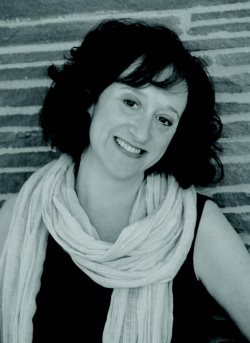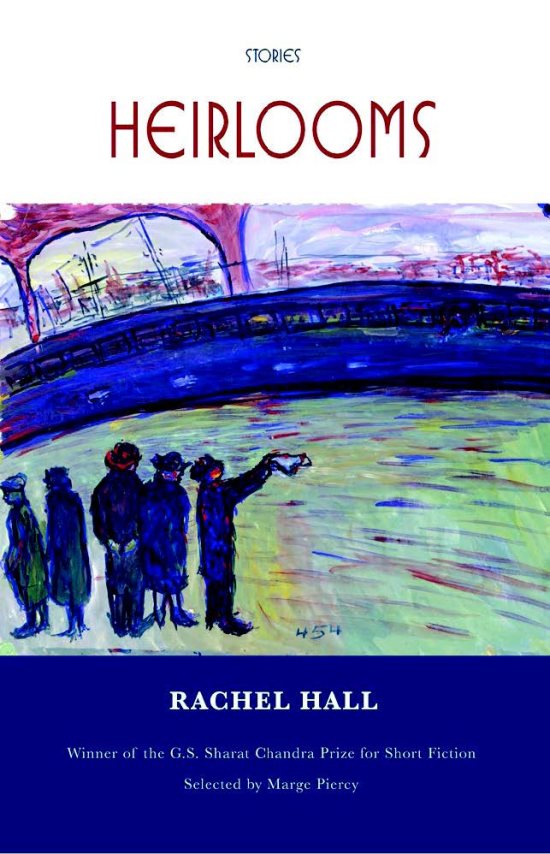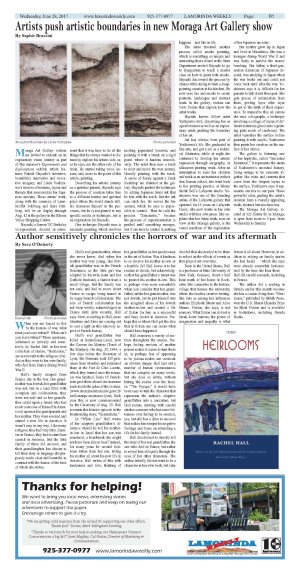| | Published June 28th, 2017
| Author sensitively chronicles the horrors of war and its aftermath
| | | By Sora O'Doherty |  | | Rachel Hall Photo provided |
When you are forced to flee by the horrors of war, what must you leave behind? What can't you leave behind? These questions, addressed so lyrically and sensitively by Rachel Hall in her new collection of stories, "Heirlooms," are as relevant to the refugees of today as they were to her own family, who fled from France during World War II.
 Hall's family escaped from France late in the war. Her grandmother was Jewish, her grandfather was not, but in a land filled with occupiers and collaborators, they were not safe and so her grandfather called upon a friend who had made a success of himself in America to sponsor her grandparents and her mother. They were rescued and started a new life in America. It wasn't easy in any way. Like many refugees, they had very little. Farmers in France, they had to start from scratch in America. But the little family of three did succeed, and their granddaughter has chosen to tell their story in language she purposely made clear and beautiful to contrast with the horror of the time of which she writes.
Hall's family escaped from France late in the war. Her grandmother was Jewish, her grandfather was not, but in a land filled with occupiers and collaborators, they were not safe and so her grandfather called upon a friend who had made a success of himself in America to sponsor her grandparents and her mother. They were rescued and started a new life in America. It wasn't easy in any way. Like many refugees, they had very little. Farmers in France, they had to start from scratch in America. But the little family of three did succeed, and their granddaughter has chosen to tell their story in language she purposely made clear and beautiful to contrast with the horror of the time of which she writes.
 Hall's real grandmother, whom she never knew, died when her mother was very young. Her Jewish grandfather was in the French Resistance, so the little girl was adopted by his twin sister and her Catholic husband, a farmer from a small village. But the family was not safe, and had to move about France to escape being turned in by eager French collaborators. The role of French collaboration has not been widely acknowledged in France until quite recently, Hall says. Now, according to Hall, more literature and films are coming out to cast a light on this unlovely aspect of French history.
Hall's real grandmother, whom she never knew, died when her mother was very young. Her Jewish grandfather was in the French Resistance, so the little girl was adopted by his twin sister and her Catholic husband, a farmer from a small village. But the family was not safe, and had to move about France to escape being turned in by eager French collaborators. The role of French collaboration has not been widely acknowledged in France until quite recently, Hall says. Now, according to Hall, more literature and films are coming out to cast a light on this unlovely aspect of French history.
 Hall's real grandfather was killed at Saint-Genis-Laval, now the Caveau des Martyrs (Tomb of the Martyrs). On Aug. 20, 1944, a few days before the liberation of Lyon, the Germans took 120 prisoners from Montluc and murdered them at the Fort de Cote Lorette, which they burned once the massacre was finished. Some 10 Frenchmen gave them a hand. An immense tomb holds the ashes of the victims. (www.cheminsdememoire.gouv.fr/en/footsteps-resistance-lyon) Each year this is now commemorated by the Ceremony of Aug. 20. Hall recounts this historic episode in the heartrending story, "Generations."
Hall's real grandfather was killed at Saint-Genis-Laval, now the Caveau des Martyrs (Tomb of the Martyrs). On Aug. 20, 1944, a few days before the liberation of Lyon, the Germans took 120 prisoners from Montluc and murdered them at the Fort de Cote Lorette, which they burned once the massacre was finished. Some 10 Frenchmen gave them a hand. An immense tomb holds the ashes of the victims. (www.cheminsdememoire.gouv.fr/en/footsteps-resistance-lyon) Each year this is now commemorated by the Ceremony of Aug. 20. Hall recounts this historic episode in the heartrending story, "Generations."
 In "White Lies" Hall writes of her adoptive grandfather's dilemma: should he tell his mother-in-law in Israel that her son was murdered, a heartbreak she might not have been able to bear? Instead, for many years he created fictitious letters from her son, telling his mother all about his new life in America. Hall writes of this with tenderness and love, thinking of her grandfather as her predecessor in the art of fiction. Was it kindness to so deceive his mother-in-law, or a horrible lie? Hall leaves it to her readers to decide, but acknowledges that her grandfather's intent was to protect his mother-in-law. This is perhaps even more remarkable when you consider that her grandfather, unlike her grandmother, was not Jewish, yet he put himself into the imagined shoes of his Jewish brother-in-law and created a life of fiction for him as a successful and busy doctor in America. Perhaps this is where Hall got the idea that in fiction one can create what should have happened.
In "White Lies" Hall writes of her adoptive grandfather's dilemma: should he tell his mother-in-law in Israel that her son was murdered, a heartbreak she might not have been able to bear? Instead, for many years he created fictitious letters from her son, telling his mother all about his new life in America. Hall writes of this with tenderness and love, thinking of her grandfather as her predecessor in the art of fiction. Was it kindness to so deceive his mother-in-law, or a horrible lie? Hall leaves it to her readers to decide, but acknowledges that her grandfather's intent was to protect his mother-in-law. This is perhaps even more remarkable when you consider that her grandfather, unlike her grandmother, was not Jewish, yet he put himself into the imagined shoes of his Jewish brother-in-law and created a life of fiction for him as a successful and busy doctor in America. Perhaps this is where Hall got the idea that in fiction one can create what should have happened.
 Hall examines a variety of motives throughout the stories. Perhaps feeling envious of another person makes it easier to turn them in, or perhaps fear of appearing to be jealous makes one overlook an obvious danger. Hall lays out a number of human circumstances that are complex on many levels, but she does so subtly, without hitting the reader over the head. In ""En Voyage," it would have been easy to turn the character that represents the author's adoptive grandfather into a caricature, but Hall resists, drawing with careful strokes someone who has some bitterness over having to be rescued, yes, but still has a drive to succeed that makes him temper his negative feelings and focus on rebuilding a life for his family instead.
Hall examines a variety of motives throughout the stories. Perhaps feeling envious of another person makes it easier to turn them in, or perhaps fear of appearing to be jealous makes one overlook an obvious danger. Hall lays out a number of human circumstances that are complex on many levels, but she does so subtly, without hitting the reader over the head. In ""En Voyage," it would have been easy to turn the character that represents the author's adoptive grandfather into a caricature, but Hall resists, drawing with careful strokes someone who has some bitterness over having to be rescued, yes, but still has a drive to succeed that makes him temper his negative feelings and focus on rebuilding a life for his family instead.
 Hall decided not to directly tell the story of her real grandfather, the one who died in France, but rather to reveal him obliquely through the eyes of her other characters. The author initially did not want to be a character in her own book, but later decided that she needed to be there to reflect on the effects of events as they played out over time.
Hall decided not to directly tell the story of her real grandfather, the one who died in France, but rather to reveal him obliquely through the eyes of her other characters. The author initially did not want to be a character in her own book, but later decided that she needed to be there to reflect on the effects of events as they played out over time.
 Born in the United States, Hall is a professor at State University of New York, Geneseo, about a half hour north of her home in Rochester. She commutes to the historic village that houses the university, where she teaches creative writing. She lists as among her influences authors Elizabeth Strout and Alice Munro. Fiction, she says, is not memory. What fiction can do best is break down barriers; the power of imagination and empathy is what fiction is all about. However, in addition to relying on family stories she had heard - which she says were already somewhat factionalized by the time she hear them - Hall did careful research, including in France.
Born in the United States, Hall is a professor at State University of New York, Geneseo, about a half hour north of her home in Rochester. She commutes to the historic village that houses the university, where she teaches creative writing. She lists as among her influences authors Elizabeth Strout and Alice Munro. Fiction, she says, is not memory. What fiction can do best is break down barriers; the power of imagination and empathy is what fiction is all about. However, in addition to relying on family stories she had heard - which she says were already somewhat factionalized by the time she hear them - Hall did careful research, including in France.
 The author did a reading in Orinda earlier this month because she has a cousin living here. "Heirlooms," published by BkMk Press, won the G.S. Sharat Chandra Prize for Short Fiction and is available in bookstores, including Orinda Books.
The author did a reading in Orinda earlier this month because she has a cousin living here. "Heirlooms," published by BkMk Press, won the G.S. Sharat Chandra Prize for Short Fiction and is available in bookstores, including Orinda Books.


|
 | | | | | | | | | | | | | |




